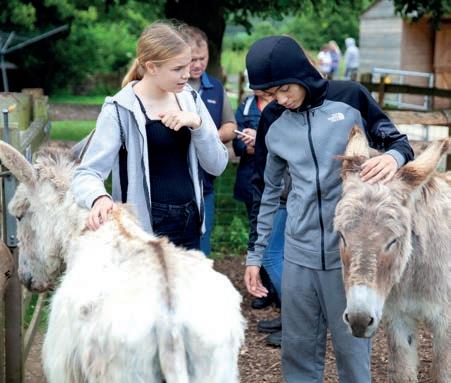
6 minute read
Navigating the transition


he pace of agricultural transition
Thas quickened over the last year – and the CLA has been working hard to ensure members are supported and involved as the process develops.
Since the UK voted to leave the EU, the CLA has taken a lead role in England and Wales in the development of legislation and policies for this new era. The introduction of the Agriculture Act 2020 signalled a change in pace in England, with the focus shifting from policy development to implementation, and the CLA has been heavily involved.
In England, our in uence started early with the publication of the CLA Land Management Contract in May 2018, setting out how a payment for public goods scheme should be designed to work for farmers, land managers and the environment. It was the fi rst of its kind and has stood the test of time. We still revisit the document to get back to those principles, and it is remarkable how similar the Environmental Land Management (ELM) scheme is to it.
The Welsh Government, meanwhile, is bringing forward its own Agriculture Bill in the spring of 2022, which will set out legislation for the new land use policy based on the principle of Sustainable Land Management, known as the Sustainable Farming Scheme (SFS). It will also set out how Welsh Government will transition and prepare the industry before full roll-out of the SFS from January 2025. The CLA Cymru team is closely involved in the co-design of the scheme and will encourage members to take part in the testing and piloting of the SFS.
Susan Twining, CLA Chief Land Use Policy Adviser, says: “Shifting from a system based around direct payments to one that pays for public goods is a good ambition, but it must be done carefully.
“The CLA has worked with Defra in developing a range of programmes to support farmers and land managers in the transition, including new grant schemes and advisory programmes.”
We are now at a point where new policies in England have launched, although at diff erent times, and many will evolve. We have created a comprehensive digital hub containing member briefi ngs, analysis on the latest policies and schemes, and signposting to more information.

Sustainable FarmingIncentive

One of the new schemes is the Sustainable Farming Incentive (SFI), for which all those who currently receive Basic Payments will be eligible for. It is the fi rst of three ELM schemes, to be followed by Local Nature Recovery and Landscape Recovery. The government aims for 70% of farmers to have entered the SFI by 2028.
The CLA ran a webinar for members on the SFI with Defra, which covered details of other initiatives that the CLA has been involved in, including the Farming in Protected Landscapes scheme and the Future Farming Resilience Fund, and plans for the new Farming Investment Fund and Animal Health and Welfare Pathway. You can watch this webinar on the CLA website. We also ran a series of regional webinars with Defra and we will continue to bring you more updates in 2022.
“We have been having meetings with the Rural Payments Agency to see how these new schemes sit alongside the BPS and Countryside Stewardship schemes, and to make sure the existing schemes are working well, as they are still the main sources of funding for now,” says Susan.
VISIT cla.org. uk/campaigns/ agriculturaltransition
Navigating the transition
CLA Chief Land Use Adviser Susan Twining sets out how the CLA continues to help shape the agricultural transition agenda for the benefi t of members
tiatives that the CLA volved in, including g in Protected s scheme and the ming Resilience plans for the g Investment Animal Health e Pathway. tch this the CLA e also well, as they are still the main funding for now,” says Sus
ELM tests and trials ELM tests and
Another area the CLA has been Another area the CL heavily involved in is ELM tests heavily involved in is and trials, which form part of and trials, which for the Defra co-design process. the Defra co-desig
We ran projects on incentives We ran projects o for sustainable farming and for sustainable f forestry practices, and one forestry practic on the Wildlife Estates on the Wildlife





accreditation. We also conducted a project on woodland and forestry payment rates, which gave CLA members the opportunity to in uence the woodland aspects of the future ELM schemes.
Susan says: “The CLA and our members are making a vital contribution in shaping what these schemes will look like, and much is being learnt from the pilots and tests.
“This is just one of the many reasons why CLA membership is so important, particularly at this time of change. Farming businesses need to make plans now for how they are going to manage this change, and the CLA is here to help members navigate these early stages of transition and get the most out of the new grants and schemes.”
Farming productivity
Farming productivity is also high on the CLA agenda. As part of the new Farming Investment Fund, farmers can apply for grants through the Farming Equipment and Technology Fund, which the CLA helped to shape. Applicants can purchase items from a set list of equipment, and the CLA has successfully lobbied for the inclusion of additional items.
We are also part of the Agricultural Productivity Task Force, working with government to design and deliver policy change supporting sustainable productivity.
“There are many pressures on the sector, aside from transition, and the CLA is involved here, too. Recent consultations we have responded to include the proposal to ban solid urea fertiliser, proposed changes to livestock transportation, gene editing and bovine TB, and we’ve also responded to Defra’s consultation on the proposal to off er an industry exit scheme in 2022 and to delink BPS payments from 2024.”
Meanwhile, CLA Cymru has a programme of engagement with the Welsh Government and key stakeholders to represent members and ensure the Agriculture (Wales) Bill works for the long-term sustainability of rural Wales. The Welsh Government has also committed to the extension of Glastir until the end of 2023 following extensive lobbying from the CLA and members.
Overall, it’s a time of great change in the industry, which presents challenges but also many opportunities. Susan adds: “There is much to like in the new policy direction, and we welcome the vision to achieve the twin objectives of a sustainable and profi table farming sector and of environmental recovery, as one cannot exist without the other. Uncertainties do remain, and the CLA will be lobbying and working diligently on your behalf.
“The CLA has developed strong relationships with governments, Parliament and the Senedd, and is respected for a balanced and forward-thinking approach, which provides many avenues to fi ght for our members’ interests.”










